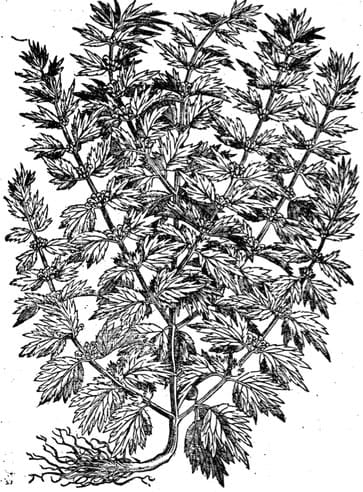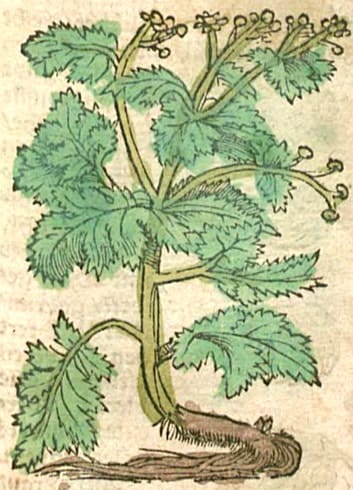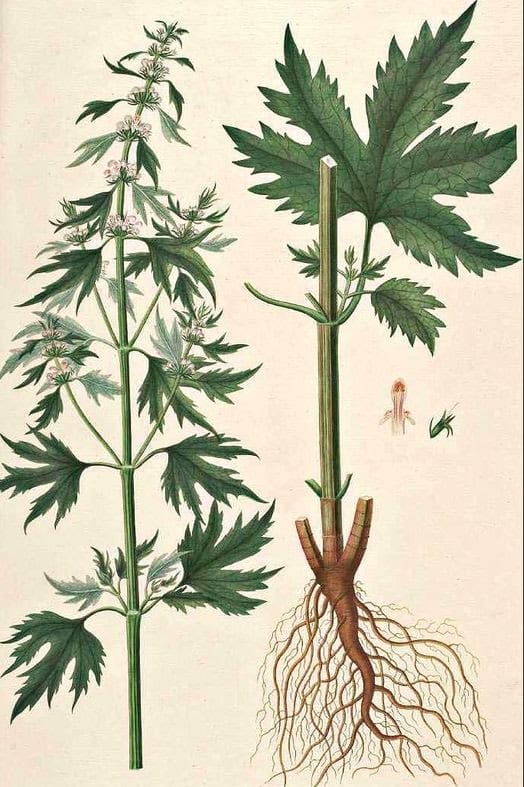Leonurus, Motherwort, Yi Mu Cao 益母草Also called Cardiaca, MatricariaYi Mu Cao (TCM) |

|

|

|

|
|
Leonurus New Kreuterbuch, Matthiolus, 1563 |
Leonurus Kurtzes Handtbuchlein, Ryff, 1599 |
 L. cardiaca
L. cardiacaOeder et al., Flora Danica, 1756 (1761-1883)
 Members CLICK HERE for the PRO VERSION
Members CLICK HERE for the PRO VERSIONBotanical name:
Leonurus cardiaca (syn. L. crispus, L. campestris, L. glabra, L. discolor)
In TCM L. heterophyllus (syn. L. artermisia), L. sibiricus, L. macrathus and L. turkestanicus (in Xinjiang) are used.
Parts used:
Herb
Temperature & Taste:
Cool, dry (regarded as Warm in the West); Pungent, Bitter.
Classifications:
3D. CORDIALS & CARDIACS. 3G. EMMENAGOGUE
4c. CARDIAC. 4i. UTERINE
Uses:
1. Moves the Blood, Resolves Stasis, Promotes Menstruation (TCM, West):
-irregular Menstruation, Menstrual cramping and pain, heavy menstruation with clotting
-PMS, irritability associated with Menstruation; Menopausal symptoms
-Traumatic pain, Bruising, Hematoma
2. Moves the Blood, Calms the Mind and Nerves, Benefits the Heart (West):
-‘there is no better herb to take Melancholy vapours from the Heart … and makes a merry, cheerful Soul … of much use in trembling of the Heart’. (Culpeper)
–Oppression or Pain of the Chest, Palpitations, Rapid Heartbeat, Fainting, especially when related to Anxiety.
-Nervous Debility, Irritability in the elderly; Restlessness and Insomnia; Hyperthyroidism (especially with Palpitations)
3. Promotes Urine (TCM, West):
-Edema
-Nephritis, Hematuria, acute Renal Failure
-Gravel, Stones
4. Clears Heat, Stops Bleeding (TCM, West):
-Blood in the Urine, in the Stool, Uterine Bleeding, Postpartum Bleeding, Bloody Dysentery
5. Clears Phlegm, Relieves Wheezing (West):
-cold phlegm in the Lungs; Coughs and Asthma
6. Clears Heat, Resists Poison:
-Putrid Fevers (West)
-sores, abscesses, eczema, erysipelas, toxic swellings, itchy skin rashes (TCM, West)
7. Kills Worms (West)
8. Externally:
-externally for ‘suffocation of the Womb’, to promote Menstruation (as a Pessary)
-hardness of the Breasts (in a poultice)
-eases Gout pain
-relieves Fever
Dose:
Decoction: 6–15 grams
Powder: 1–3 grams
Comment:
1. The various species of Motherwort are used very similarly, especially in regards of its gynecological effects. The Chinese name Yi Mu Cao translates as ‘Benefit Mother herb’, a clear sign that its traditional use is akin to the western Motherwort.
2. The Chinese also use Motherwort seed (Chong Wei Zi); used similarly for irregular Menstruation, Dysmenorrhea, Amenorrhea, Postpartum abdominal pain; also for Liver heat with Headache, red and painful Eyes.
Substitutes
Mugwort has been used as a substitute.

Main Combinations:
Motherwort & Cyperus
1. Promote menstruation and clear Wind of the Womb, Motherwort with … available in PRO version
2. Irregular or scanty Menstruation or Infertility from Blood stasis, combine Motherwort with … available in PRO version
3. Threatened Miscarriage, Motherwort with … available in PRO version
4. Ovarian pain and inflammation, Motherwort with … available in PRO version
5. To benefit the Heart, Motherwort with … available in PRO version
6. Heart disorders with Anxiety or nervousness, combine Motherwort with … available in PRO version
7. Hyperthyroidism, Motherwort with … available in PRO version
8. Hypotension, Motherwort with … available in PRO version
9. Nephritis, Motherwort with … available in PRO version
10. Glomerulonephritis, Motherwort with … available in PRO version
Major Formulas
Decoction for Threatened Miscarriage (Gabelhover)
Decoction for the Womb (Schroder)
Tincture for Paralysis
Tian Ma Gou Teng Yin
Cautions:
1. Generally not used during pregnancy. Specialists in China have used the Chinese Motherwort in some ante-partum disorders associated with Blood stagnation, but it must be used cautiously. It has also been used for threatened Miscarriage in the West (see Decoction for Threatened Miscarriage, above). It is only suitable for cases with Heat and excess in which case it can be used for Bleeding during pregnancy, but dosage should be low-to-moderate. It has been used in the time leading up to Birth to prepare the Uterus.
2. Not used in marked Qi and Blood weakness or signs of Cold.
Drug Interactions:
1. May interact with anticoagulant medication.
Main Preparations used:
Distilled Water, Salt of the Ashes, Syrup, less commonly the Distilled Oil
